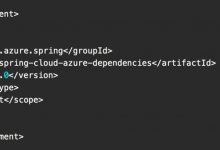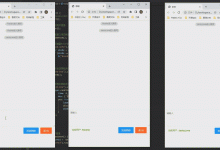第三周作业,可能是异常那一章当时没怎么听,此前也不怎么接触,感觉还挺陌生的。
00 第1题
00-1 题目
/** To change this license header, choose License Headers in Project Properties.* To change this template file, choose Tools | Templates* and open the template in the editor.*/package homework_week3;/**** @author zzrs123*/public class Homework_week3 {/*** @param args the command line arguments*/public static void main(String[] args) {int a=0, b=5;try{System.out.print(a/b+b/a);}catch{System.out.println("Exceptions!!!");}}}
编译以上代码,会出现什么错误?
A. Prints: Exceptions!!!B. Prints NothingC. Syntax errorD. Runtime ErrorE. None of the above
00-2 解答
Answer: D
catch处语法出错,导致不能编译: Uncompilable source code – 非法的类型开始;
如果改为:
catch (ArithmeticException e){System.out.println("Exceptions!!!");}
那么就会输出
Exceptions!!!
。
考察的是
try + catch + finally
异常捕获机制的语法:如果
try{}
抛出的对象属于
catch()
括号内欲捕获的异常类,则
catch()
会捕捉此异常,然后进到
catch()
的块里继续运行。
01 第2题
01-1 题目
/** To change this license header, choose License Headers in Project Properties.* To change this template file, choose Tools | Templates* and open the template in the editor.*/package homework_week3;/**** @author zzrs123*/public class Homework_week3 {/*** @param args the command line arguments*/public static void main(String[] args) {int a=0, b=5;String c[] = {"A","B","C"};try{for(int i = 1;i < 4; i++){System.out.print(c[i]);}System.out.print(a/b+b/a);}catch (ArithmeticException e){System.out.println("D");}catch(ArrayIndexOutOfBoundsException e){System.out.println("E");}}}
编译并执行代码,会出现哪种结果?
A. Prints: ABCB. Prints: ABDC. Prints: BCED. Prints: BCDEE. Compiler Error
01-2 解答
**Answer: **C
这道题就考察了
try + catch + finally
的运行机制,检测到
for
循环里出现数组下标溢出,就抛出异常,产生中断,接着匹配到第二个catch语句块
catch(ArrayIndexOutOfBoundsException)
,输出
E
。
考察的是
try + catch + finally
异常捕获机制的捕获到异常立刻中断,进入异常处理。
02 第3题
02-1 题目
/** To change this license header, choose License Headers in Project Properties.* To change this template file, choose Tools | Templates* and open the template in the editor.*/package homework_week3;/**** @author zzrs123*/public class Homework_week3 {/*** @param args the command line arguments*/public static void main(String[] args) {int a=0, b=5;String c[] = {"A","B","C"};try{System.out.print(c[a/b]);try{for(int i = 1;i < 4; i++){System.out.print(c[i]);}}catch (Exception e){System.out.println("D");}finally{System.out.println("E");}}catch(Exception e){System.out.println("F");}finally{System.out.println("G");}}}
编译并执行代码,会出现哪种结果?
A. Prints: AABCGB. Prints: ABCDGC. Prints: AABCDGD. Prints: AABCDEGE. Prints: AABCDEFG
02-2 解答
Answer: D
两个
try + catch + finally
的嵌套,考察的知识是:
" 无论 try 程序块是否有捕捉到异常,或者捕捉到的异常是否与 catch()括号里的异常相同,最后一定会运行 finally 块里的程序代码。finally 的程序代码块运行结束后,程序再回到 try-catch-finally 块之后继续执行。"
03 第4题
03-1 题目
/** To change this license header, choose License Headers in Project Properties.* To change this template file, choose Tools | Templates* and open the template in the editor.*/package homework_week3;/**** @author zzrs123*/public class Homework_week3 {/*** @param args the command line arguments*/public static void main( String[] args ) {int src[] = {10, 9, 8, 7, 6, 5, 4, 3, 2, 1};int res[] = {1, 2, 3, 4, 5};System.arraycopy(src, 0, res, 0, src.length);for(int i=0; i<res.length; i++) {System.out.print(res[i]);}}}
What is the result?
A. 10987654321B. 10987612345C. 12345612345D. Compiler errorE. Runtime exception
03-2 解答
Answer: E
很明显,这里的语句都符合语法,所以Compiler error可以排除;
而
arraycopy()
函数的语法:
public static void arraycopy(Object src, int srcPos, Object dest, int destPos, int length)
参数说明:
- Object src : 原数组
- int srcPos : 拷贝到原数组的起始位置
- Object dest : 目标数组
- int destPos : 目标数组的开始起始位置
- int length : 要copy的数组的长度
题目中,要向长度为5的数组放入10个元素,所以运行到这个函数的时候,会发生越界错误,采取java默认的异常处理机制,直接抛出异常中断:
ArrayIndexOutOfBoundsException
。
04 第5题
04-1 题目
/** To change this license header, choose License Headers in Project Properties.* To change this template file, choose Tools | Templates* and open the template in the editor.*/package homework_week3;/**** @author zzrs123*/public class Homework_week3 {/*** @param args the command line arguments*/public static void main( String[] args ) {byte a[] = new byte[2];long b[] = new long[2];float c[] = new float[2];Object d[] = new Object[2];System.out.print(a[1]+","+b[1]+","+c[1]+","+d[1]);}}
编译并执行代码,会出现哪种结果?
A. Prints: 0,0,0,nullB. Prints: 0,0,0.0,nullC. Prints: 0,0,0,0D. Prints: null,null,null,nullE. The code runs with no output.
04-2 解答
Answer: B
在new一个数组的时候,默认初始化为0,当然,这种初始化契合于数据类型,比如
float
要初始化为0.0,
Object
初始化为
null
。
05 第6题
05-1 题目
1. class A {2. public static void main(String[] args) {3. int[ ] var1;4. int[5] var2;5. int[] var3;6. int var4[];7. }8. }
编译并执行代码,会出现哪种结果?
A. compile-time errors occur at line 3B. compile-time errors occur at line 4C. compile-time errors occur at line 5D. compile-time errors occur at line 6E. None of the above
05-2 解答
Answer: B
这两道题考察的都是数组的声明、分配内存和初始化,
一维数组的声明与分配内存:
-
数据类型 数组名[ ] ; // 声明一维数组
-
数组名 = new 数据类型[个数] ; // 分配内存给数组
声明数组的同时分配内存:
-
数据类型 数组名[] = new 数据类型[个数]
06 第7题
06-1 题目
/** To change this license header, choose License Headers in Project Properties.* To change this template file, choose Tools | Templates* and open the template in the editor.*/package homework_week3;/**** @author zzrs123*/public class Homework_week3 {/*** @param args the command line arguments*/static void my() throws ArithmeticException {System.out.print("A");throw new ArithmeticException("A");}public static void main (String args []) {try {my();}catch (Exception e) {System.out.print("B");}finally {System.out.print("C");}}}
编译并执行代码,会出现哪种结果?
A. Prints: AB. Prints: ACC. Prints: ABCD. Prints: AABCE. Prints: C
06-2 解答
Answer: C
考察的是
throw
指定方法抛出异常的知识:
-
用处:
如果方法内的程序代码可能会发生异常,且方法内又没有使用任何的代码块来捕捉这些异常时,则必须在声明方法时一并指明所有可能发生的异常,以便让调用此方法的程序得以做好准备来捕捉异常。也就是说,如果方法会抛出异常,则可将处理这个异常的
try-catch-finally
块写在调用此方法的程序代码内。
-
语法:
方法名称(参数…) throws 异常类 1,异常类 2,…
-
具体执行:
throws
在指定方法中不处理异常,在调用此方法的地方处理,如果指定方法中异常,则在调用处进行处理(进入
catch()
)
所以这道题的运行过程为:
main函数-> try()块-> my函数-> 输出A -> new ArithmeticException(“A”)-> catch()-> 输出B-> finally()-> 输出C
07 第8题
07-1 题目
/** To change this license header, choose License Headers in Project Properties.* To change this template file, choose Tools | Templates* and open the template in the editor.*/package homework_week3;/**** @author zzrs123*/class B extends Exception {}class C extends B {}class D extends C {}public class Homework_week3 {/*** @param args the command line arguments*/public static void main(String args[]) {int a,b,c,d,x,y,z;a = b = c = d = x = y = 0;z = 1;try {try {switch(z) {case 1: throw new B();case 2: throw new C();case 3: throw new D();case 4: throw new Exception();}a++;//a=0}catch ( C e ) {b++;}//b=0finally{c++;}//c=1}catch ( B e ) {d++;}//d=1catch ( Exception e ) {x++;}//x=0finally {y++;}//y=1System.out.print(a);System.out.print(b);System.out.print(c);System.out.print(d);System.out.print(x);System.out.print(y);}}
编译并执行代码,会出现哪种结果?
A. 0,0,1,1,0,1B. 0,1,0,1,1,0C. 0,0,1,1,0,1D. 0,1,1,1,1,1E. 1,1,0,1,0,0
07-2 解答
Answer: AC
这道题的亮点是异常类的层层继承,人脑运行的关键在于:如果报了一个类的错误,那么catch其父类和子类的块会不会响应。
答案是不会,
catch
只能识别错误本身。
此外就是运行到
case 1: throw new B();
时,程序就中断,直接进入
catch()
区,不会运行
a++
。
08 第9题
08-1 题目
/** To change this license header, choose License Headers in Project Properties.* To change this template file, choose Tools | Templates* and open the template in the editor.*/package homework_week3;/**** @author zzrs123*/1.class B extends Exception {2. public void myMethod( ) throws RuntimeException {}3.}4.5.public class Homework_week3 extends B {/*** @param args the command line arguments*/6. public void myMethod( ) throws Exception {}7. public static void main (String[] args) {}8.}
编译错误会出现在哪一行?
A. 1B. 2C. 6D. 7E. None of the above
08-2 解答
Answer: C
0330 这个问题不是很明白,还是编译错误,所以也很难从IDE得到点什么,查了查,有两点:
- 子类中覆盖方法的访问权限不能比父类小,比如父类的
myMethod( )
是public类型,子类的不能是private。
- 子类中覆盖方法抛出的异常只能比父类中原方法抛出的异常低级,比如父类抛出
Exception
,而子类的覆盖方法只能抛出
RuntimeException
之类的子异常。
09 第10题
09-1 题目
class A {public static void main (String[] args) {int a=1, b=0;int c[] = {1,2,3};try {System.out.print(c[1]);try {System.out.print(a/b+b/a);}catch (ArithmeticException e){System.out.print(“C”);}}catch (ArrayIndexOutOfBoundsException e) {System.out.print(“A”);}finally {System.out.print(“B”);}}}
编译并执行代码,会出现哪种结果?
(A) 1BC(B) 1CB(C) 2BC(D) 2CB(E) 2AC
09-2 解答
Answer: D
这道题相对常规,是一个
try-catch-finally
的嵌套问题,
System.out.print(c[1]);try {System.out.print(a/b+b/a);}catch (ArithmeticException e){System.out.print(“C”);}
正常输出c[1] 为2,然后进入内层的 try,发现异常,捕获输出 C,接着出来进入外层 try 的catch,未捕获异常,进入外层的 finally ,输出 B 。
 爱站程序员基地
爱站程序员基地

